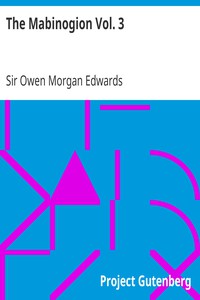The Mabinogion Vol. 2 by Sir Owen Morgan Edwards and Lady Charlotte Schreiber (early readers .txt) 📗

Book online «The Mabinogion Vol. 2 by Sir Owen Morgan Edwards and Lady Charlotte Schreiber (early readers .txt) 📗». Author Sir Owen Morgan Edwards and Lady Charlotte Schreiber
Transcribed from the 1902 Fisher Unwin edition by David Price, email ccx074@pglaf.org
THE MABINOGIONTRANSLATED FROM THE RED BOOK OF HERGEST BY LADY CHARLOTTE GUEST
VOL. II. LONDON
T. FISHER UNWIN
11 PATERNOSTER
BUILDINGS. MXCII
In this second volume, as in the first, I have given Lady Charlotte Guest’s translation exactly as she wrote it. It would have been easy to make it a more faithful reproduction of the Welsh by occasionally changing a word, or by making a phrase more simple in diction. But the reader would not have forgiven me for placing before him a translation that was not Lady Charlotte Guest’s. I have again ventured, however, after a careful comparison of the translation with the original, to put in the form of footnotes a more accurate or more literal rendering of passages which Lady Charlotte Guest did not read aright, passages which she has omitted, and passages the real meaning of which she seems to me to have failed to grasp.
The first two tales in this volume make up, with “The Dream of Rhonabwy,” the second volume of the original edition. “The Dream of Rhonabwy” was placed in my first volume, with “The Lady of p. 6the Fountain” and “Peredur”—the two tales that form the first volume of the original edition. The oldest of the tales—the Mabinogion proper—will all be included in the third volume.
OWEN EDWARDS.
Llanuwchllyn,
June 1902.
Arthur was accustomed to hold his Court at Caerlleon upon Usk. And there he held it seven Easters, [7a] and five Christmases. And once upon a time he held his Court there at Whitsuntide. For Caerlleon was the place most easy of access in his dominions, both by sea and by land. And there were assembled [7b] nine crowned kings, who were his p. 8tributaries, and likewise earls and barons. For they were his invited guests at all the high festivals, unless they were prevented by any great hindrance. And when he was at Caerlleon, holding his Court, thirteen churches were set apart for mass. And thus were they appointed: one church for Arthur, and his kings, and his guests; and the second for Gwenhwyvar and her ladies; and the third for the Steward of the Household and the Suitors; and the fourth for the Franks, and the other officers; and the other nine churches were for the nine Masters of the Household, and chiefly for Gwalchmai; for he, from the eminence of his warlike fame, and from the nobleness of his birth, was the most exalted of the nine. And there was no other arrangement respecting the churches than that which we have mentioned above.
Glewlwyd Gavaelvawr was the chief porter; but he did not himself perform the office, except at one of the three high festivals, for he had seven men to serve him; and they divided the year amongst them. They were Grynn, and Pen Pighon, and Llaes Cymyn, and Gogyfwlch, and Gwrdnei with Cat’s eyes, who could see as well by night as by day, and Drem the son of Dremhitid, and Clust the son of Clustveinyd; and these were Arthur’s guards. And on Whit Tuesday, as the King sat at the banquet, lo! there entered a tall, fair-headed youth, clad in a coat and a surcoat of diapred satin, and a golden-hilted sword about his neck, and low shoes of leather upon his feet. And he came, and stood before Arthur. “Hail to thee, Lord!” said he. “Heaven prosper thee,” he answered, “and be thou welcome. Dost thou bring any new tidings?” “I do, Lord,” he said. “I know thee not,” said Arthur. “It is a p. 9marvel to me that thou dost not know me. I am one of thy foresters, Lord, in the Forest of Dean, and my name is Madawc, the son of Twrgadarn.” “Tell me thine errand,” said Arthur. “I will do so, Lord,” said he. “In the Forest I saw a stag, the like of which beheld I never yet.” “What is there about him,” asked Arthur, “that thou never yet didst see his like?” “He is of pure white, Lord, and he does not herd with any other animal through stateliness and pride, so royal is his bearing. And I come to seek thy counsel, Lord, and to know thy will concerning him.” “It seems best to me,” said Arthur, “to go and hunt him to-morrow at break of day; and to cause general notice thereof to be given to-night in all quarters of the Court.” And Arryfuerys was Arthur’s chief huntsman, and Arelivri was his chief page. And all received notice; and thus it was arranged. And they sent the youth before them. Then Gwenhwyvar said to Arthur, “Wilt thou permit me, Lord,” said she, “to go to-morrow to see and hear the hunt of the stag of which the young man spoke?” “I will, gladly,” said Arthur. “Then will I go,” said she. And Gwalchmai said to Arthur, “Lord, if it seem well to thee, permit that into whose hunt soever the stag shall come, that one, be he a knight or one on foot, may cut off his head, and give it to whom he pleases, whether to his own ladylove, or to the lady of his friend.” “I grant it gladly,” said Arthur, “and let the Steward of the Household be chastised if all are not ready to-morrow for the chase.”
And they passed the night with songs, and diversions, and discourse, and ample entertainment. And when it was time for them all to go to sleep, they went. And when the next day came, they arose; p. 10and Arthur called the attendants, who guarded his couch. And these were four pages, whose names were Cadyrnerth the son of Porthawr Gandwy, and Ambreu the son of Bedwor, and Amhar, the son of Arthur, and Goreu the son of Custennin. And these men came to Arthur, and saluted him, and arrayed him in his garments. And Arthur wondered that Gwenhwyvar did not awake, and did not move in her bed: and the attendants wished to awaken her. “Disturb her not,” said Arthur, “for she had rather sleep than go to see the hunting.”
Then Arthur went forth, and he heard two horns sounding, one from near the lodging of the chief huntsman, and the other from near that of the chief page. And the whole assembly of the multitudes came to Arthur, and they took the road to the Forest.
And after Arthur had gone forth from the palace, Gwenhwyvar awoke, and called to her maidens, and apparelled herself. “Maidens,” said she, “I had leave last night to go and see the hunt. Go one of you to the stable, and order hither a horse such as a woman may ride.” And one of them went, and she found but two horses in the stable, and Gwenhwyvar and one of her maidens mounted them, and went through the Usk, and followed the track of the men and the horses. And as they rode thus, they heard a loud and rushing sound; and they looked behind them, and beheld a knight upon a [10] hunter foal of mighty size; and the rider was a fair haired youth, bare-legged, and of princely mien, and a golden-hilted sword was at his side, and a robe and a surcoat of satin were upon him, and two low shoes of leather upon his feet; and around him was a scarf of blue p. 11purple, at each corner of which was a golden apple. And his horse stepped stately, and swift, and proud; and he overtook Gwenhwyvar, and saluted her. “Heaven prosper thee, Geraint,” said she, “I knew thee when first I saw thee just now. And the welcome of heaven be unto thee. And why didst thou not go with thy Lord to hunt?” “Because I knew not when he went,” said he. “I marvel too,” said she, “how he could go unknown to me.” “Indeed, lady,” said he. “I was fast asleep, and knew not when he went; but thou, O young man, art the most agreeable companion I could have in the whole kingdom; and it may be that I shall be more amused with the hunting than they; [11] for we shall hear the horns when they sound, and we shall hear the dogs when they are let loose, and begin to cry.” So they went to the edge of the Forest, and there they stood. “From this place,” said she, “we shall hear when the dogs are let loose.” And thereupon they heard a loud noise, and they looked towards the spot whence it came, and they beheld a dwarf riding upon a horse, stately, and foaming, and prancing, and strong, and spirited. And in the hand of the dwarf was a whip. And near the dwarf they saw a lady upon a beautiful white horse, of steady and stately pace; and she was clothed in a garment of gold brocade. And near her was a knight upon a war-horse of large size, with heavy and bright armour both upon himself and upon his horse. And truly they never before saw a knight, or a horse, or armour, of such remarkable size. And they were all near to each other.
“Geraint,” said Gwenhwyvar, “knowest thou the p. 12name of that tall knight yonder?” “I know him not,” said he, “and the strange armour that he wears prevents my either seeing his face or his features.” “Go, maiden,” said Gwenhwyvar, “and ask the dwarf who that knight is.” Then the maiden went up to the dwarf; and the dwarf waited for the maiden, when he saw her coming towards him. And the maiden enquired of the dwarf who the knight was. “I will not tell thee,” he answered. “Since thou art so churlish as not to tell me,” said she, “I will ask him himself.” “Thou shall not ask him, by my faith,” said he. “Wherefore?” said she. “Because thou art not of honour sufficient to befit thee to speak to my Lord.” Then the maiden turned her horse’s head towards the knight, upon which the dwarf struck her with the whip that was in his hand across the face and the eyes, until the blood flowed forth. And the maiden, through the hurt she received from the blow, returned to Gwenhwyvar, complaining of the pain. “Very rudely has the dwarf treated thee,” said Geraint. “I will go myself to know who the knight is.” “Go,” said Gwenhwyvar. And Geraint went up to the dwarf. “Who is yonder knight?” said Geraint. “I will not tell thee,” said the dwarf. “Then will I ask him himself,” said he. “That wilt thou not, by my faith,” said the dwarf; “thou art not honourable enough to speak with my Lord.” Said Geraint, “I have spoken with men of equal rank with him.” And he turned his horse’s head towards the knight, but the dwarf overtook him and struck him as he had done the maiden, so that the blood coloured the scarf that Geraint wore. Then Geraint put his hand upon the hilt of his sword, but he took counsel with himself, and considered that it would be no vengeance for him to slay the dwarf, p. 13and to be attacked unarmed by the armed knight, so he returned to where Gwenhwyvar was.
“Thou hast acted wisely and discreetly,” said she. “Lady,” said he, “I will follow him yet, with thy permission; and at last he will come to some inhabited place, where I may have arms either as a loan or for a pledge, so that I may encounter the knight.” “Go,” said she, “and do





Comments (0)